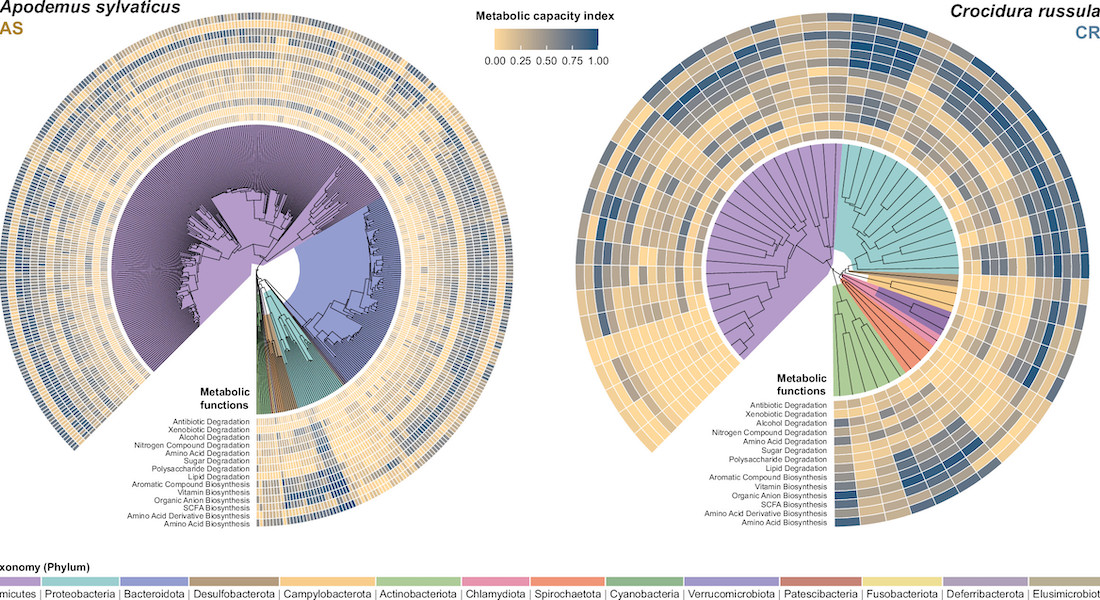New Publication Uncovers Diverse Gut Microbiome Responses in Mammals Facing Environmental Stressors
A pioneering research paper titled "Mammals Show Distinct Functional Gut Microbiome Dynamics to Identical Series of Environmental Stressors," has been published in the renowned scientific journal of the American Society for Microbiology, mBio. This study for the first time offers comparative insights into gut microbiome dynamics between mammal species.

Spanning multiple years of comprehensive investigation, the study performed a captivity experiment to compare how the taxonomic, phylogenetic, and functional microbial dynamics varied across a series of temperature and dietary disturbances in two mammals: the insectivorous-specialist Crocidura russula and the omnivorous-generalist Apodemus sylvaticus. The research team led by Adam Koziol, Antton Alberdi and colleagues from Center for Evolutionary Hologenomics and Biodonostia Health Research Institute exposed these animals to an identical set of environmental stressors, including shifts in diet, variations in temperature, and exposure to pollutants. The primary objective was to ascertain whether consistent patterns of gut microbiome response to stressors would emerge across mammals with different ecological and evolutionary features.
A myriad of responses
The results of this study unveiled a myriad of distinct responses in the gut microbiomes of various mammalian species. Interestingly, taxonomic, phylogenetic and functional diversity assessments of the microbiota yielded different patterns. The researchers modelled the functional attributes of the microbiome by distilling millions of gene annotations into dozens of functional traits per bacterial genome. Then, these traits were used to, for the first time, model the functional features of the microbiome by implementing a strategy developed for macroscopic communities, called HMSC. This novel strategy unveiled function-specific microbiota variations which aligned with the dietary behaviour of the host animals.
Last author Antton Alberdi states: "Our findings reveal that identical environmental changes can trigger very different functional responses in the gut microbiomes of mammals. These responses seem to be related to the intrinsic structure of the microbial communities as well as eco-physiological features of the host animals, such as diet or thermoregulation capacity."
Antton Alberdi further underscored the study's importance beyond its immediate scope: "This research has profound implications for conservation, animal health, and potentially human medicine. Understanding how different mammals' gut microbiomes respond to stressors enables us to foresee what kind of benefits or issues the new microbiome conformations can confer to their hosts. Expanding such analyses to more species would aid in developing targeted strategies to safeguard various species from the impacts of environmental changes."
Intricate relationships
The team have illuminated the intricate relationships between mammals and their gut ecosystems. These findings emphasise the necessity of tailored conservation efforts that account for the delicate balance between host organisms and their microbiomes.
As the scientific community delves deeper into the implications of this research, it's evident that the newfound knowledge about mammalian gut microbiomes marks a substantial advancement. The collaboration between Adam Koziol, Antton Alberdi, and their team in this multidisciplinary study has paved the way for further exploration into the intricate world of microbial communities thriving within mammals, including humans. This study is an important contribution to the expanding important scientific discoveries within the field of hologenomics. Read the full study here.
Contact:
Associate Professor Antton Alberdi
